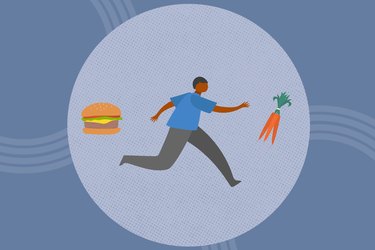
For many people, "going vegan" is bigger than just choosing what food goes in their bodies. It's also about how those choices affect everything outside of their bodies: the animals, the planet and the global community.
And while ethical and environmental reasons shouldn't be discounted, what about nutrition? Do you need to completely abandon all animal products to reap the benefits of a vegan diet?
Video of the Day
Video of the Day
For our Ask the RDs series, we asked readers to send us their biggest nutrition questions and then posed the 12 most common to a panel of registered dietitians. Many readers wanted to know more about the nutritional pros and cons of vegan eating. Here's what the experts had to say about going all veg all the time.
Is Going Vegan Good for Your Health?
"I think making the choice to live a vegan lifestyle and omit animal products and protein from your diet is one that should be highly individual.
You can be vegan and have a healthful diet when it's well-planned. You can also incorporate animal protein into your diet and have a wonderfully healthy diet. I don't think that you have to be vegan in order to reap the benefits of eating plants.
There are some [supplements] you may want to consider taking. Vitamin B12, for sure. Depending on your level of physical activity, you may want to consider adding other supplements, too — perhaps a vitamin D with a K2 and maybe a plant-based omega."
"I think that plant-based diets are a healthy way to eat, but a plant-based diet is not the same as a vegan diet.
If you're looking to be healthier and go more plant-based, try something like a meatless Monday, where one day a week you have a totally plant-based diet. Maybe that will wind up going to two days a week.
Or maybe, instead of putting animal protein on top of your salad for lunch, you use something like beans. There are ways you could be healthy with a vegetarian-type of diet without necessarily going vegan, unless that's your choice."
"With vegan diets, you're definitely cutting down on any animal proteins, so no cheese, no dairy. You're not going to be eating any animal-based fats, either, so it's an easy way to eliminate calories from those sources.
Vegan diets are also billed as anti-inflammatory because, with a high vegetable and fruit intake, you're getting tons of antioxidants. You're getting a lot of micronutrients, too, so it can be a very nutritious diet for many people.
The downside is that if you're not getting all of the B vitamins that usually come from animal protein and you're not getting enough iron, you might not feel that great at first. But that's where you'd want to talk to your health care provider about a supplementation regimen for the vitamins and minerals you may not be getting on your vegan diet."
"It's hard to argue against a plant-based diet. We need to eat more plants as a society. But there are a lot of deficiencies that can come up from eating vegan, such as protein, calcium, vitamin D, zinc and iron. Those nutrients mostly come from non-vegan foods.
It's also really hard to follow a vegan diet, even with more restaurants offering vegan options. So unless there's a reason people are going vegan — like animal welfare — for a healthy diet, I would just recommend eating more plant-based foods. Focus on trying to get your fruits and vegetables up to five to nine servings per day."
The Takeaway
You don't need to go vegan to reap the health benefits of a plant-based diet. Aim to eat between five and nine servings of fruits and vegetables each day to increase your daily micronutrient intake. Completely omitting animal products can lead to deficiencies in nutrients like B vitamins or iron, so be sure to speak with your doctor before making any big dietary changes.
Confused about nutrition? Get answers to more common questions in our Ask the RDs series.



